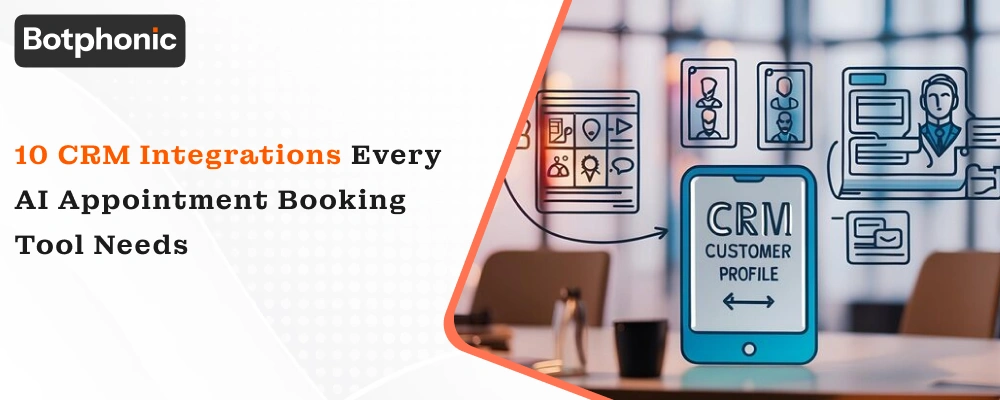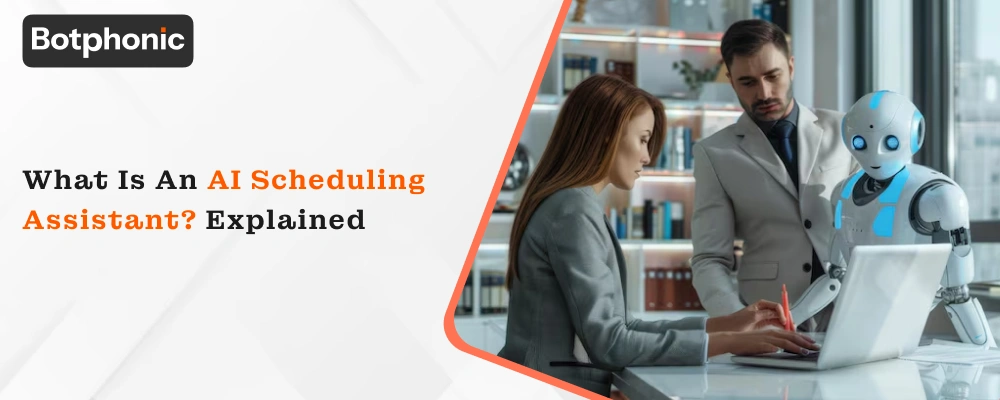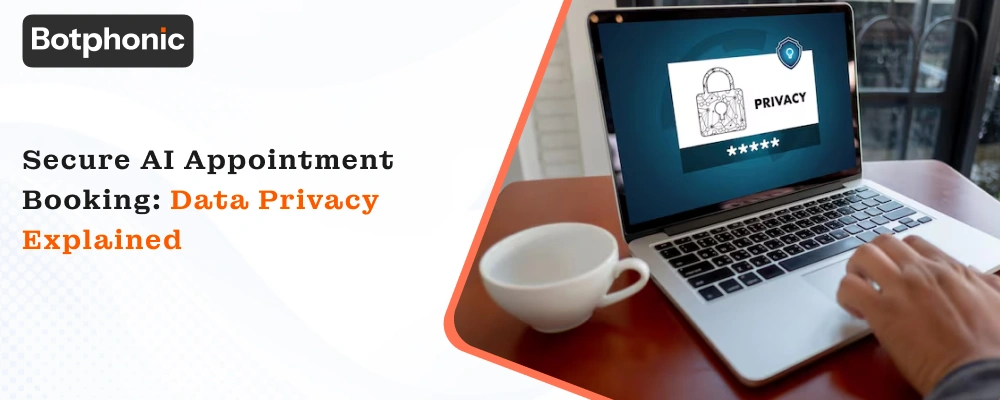
Summarize Content With:
Quick Summary
In today’s actively automated business world, secure AI appointment booking has become an essential for operational efficiency. Businesses across many industries are realizing that prioritizing just efficiency without privacy is a short-term win, which can even turn into a long-term liability. If you are looking for a future-ready appointment booking system, ensure it combines:
- Intelligent automation: An AI voice agent, chatbots, and multilingual virtual receptionists that handle scheduling effortlessly.
- Ironclad data protection: Offers encryption, compliance engines, and consent-driven design.
- Transparent governance: Ensures customers know how, why, and where clients’ data is being used.
Introduction
Let’s get into the data and acknowledge that no one’s got time to juggle calendars and answer endless booking calls. AI has also worked and stands at the front to manage the heavy lifting and turning phone lines and booking pages into a seamless experience.
But as it’s already known that automations speed up the process, the main question is does it offers data security. Privacy has also become a new pillar for trust. Businesses are facing a critical question at every aspect: Can AI appointment booking be efficient and secure at once?
Entering secure AI appointment booking software, here smart technology meets enhanced compliance. Many companies are proving that automation doesn’t have to come at the expense of privacy.
Understanding Secure AI Appointment Booking
A secure AI appointment booking system effectively automates the scheduling through advanced AI voice agents, chatbots, and virtual receptionists. It can all be achieved while encrypting, anonymizing, and protecting user data. It’s no longer about setting appointments but managing sensitive personal information responsibly. Just think of it as a virtual receptionist with encrypted security.
Let’s check out key security layers:
- End-to-End Encryption: Every interaction done between a customer and an AI voice agent is effectively secured by using encryption protocols.
- Secure API Architecture: Integration with CRMs and payment systems optimizes tokenized credentials that prevent exposure.
- Role-Based Access Control: Access is shared only to authorized members so they can view or modify booking details based on their rights.
- Automated Data Deletion Policies: Ensures that there’s compliance with retention laws, such as GDPR and CCPA.
Why Does Privacy Matter in AI Scheduling
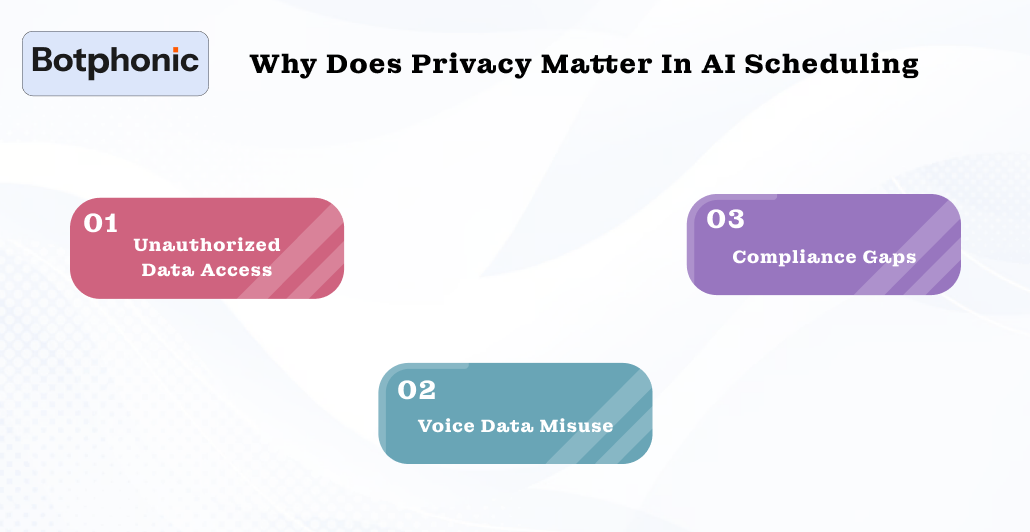
Let’s think of this situation practically: automation without privacy is a disaster that’s just waiting to happen. The average U. S business collects way more data than ever before; names, emails, phone numbers, preferences, and even voice recordings are all getting captured.
When an AI system is responsible for this data, the risk just multiplies on its own, and unless these systems are built to protect data by design.
Common Threats AI Booking Systems Face:
- Unauthorized Data Access: If there’s a poorly configured API, it can leak customer data.
- Voice Data Misuse: AI call assistant can store sensitive audio without asking for any proper consent.
- Compliance Gaps: Many booking tools are failing to meet the data protection standards, such as GDPR or HIPAA.
Businesses should have a compliance-first approach, embedding security protocols directly into the AI calling system. Every interaction, text input, or even data, everything is encrypted, anonymized, and stored under strict data governance policies.
How Does Secure AI Appointment Booking Work?
Let’s uncover this and know this in detail. When there’s a customer who is interacting with an AI voice agent appointment booking solution, there are several layers of technology working together.
- Data Capture: The system gathers the data required, such as name, preferred time, and even service type.
- Data Validation: AI verifies the gathered information for accuracy, for instance, confirming the date and time for better support.
- Encryption at Rest and in Transit: Data is encrypted and secured both during processing and even when stored.
- Compliance Engine: Real-time verification ensures that data handling is meeting all the relevant laws.
- Automated Scheduling: The appointment is then confirmed, and sensitive details are masked.
With this process, it’s no longer just automations but automation with accountability.
Multilingual and Multi-Region Privacy Compliance
The global nature business just adds to the level of complexity. If your business is serving a multilingual customer base or is operating across states, it should respect local data laws. And this is the situation when a multilingual AI appointment booking system comes in handy. It won’t be just speaking multiple languages but also complying with several regulations.
For Example:
- California: CCPA mandates that there be disclosure of data collected, along with the reason why it’s done.
- New York: The SHIELD Act requires that companies implement data security safeguards.
- Europe(if applicable): GDPR insists there’s explicit consent for personal data.
Many multilingual framework solutions and AI appointment booking for small businesses exist that ensure every interaction is captured and respects all the security standards.
The Role of the AI Voice Agent in Privacy Preservation
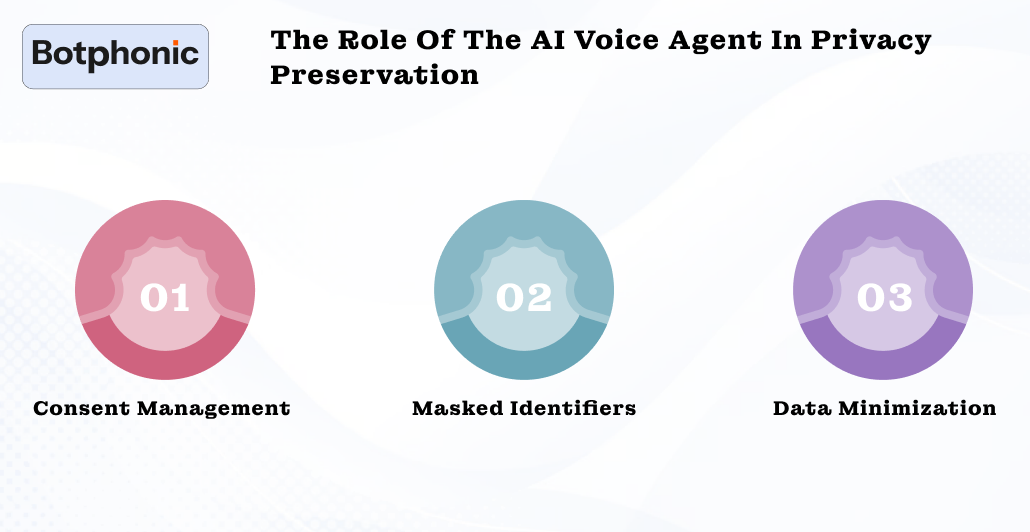
Usually, an AI virtual receptionist is the one that is the first touchpoint a customer is going to have with your business. It actively answers calls, manages bookings, and collects all the information, which means that it’s also the first line of defense for privacy.
Privacy Enhancements:
- Consent Management: The system will ask for permission even before recording or storing the data.
- Masked Identifiers: Customers’ details are managed to be anonymized in stored databases.
- Data Minimization: Even from the longer interaction, only essential data is stored and not jargon.
The combination of transparency and security effectively builds trust faster than any marketing campaign ever made.
Automated Booking and Ethical AI
Ethical AI is not just a jargon word but a business imperative. Customers are eager to be assured that their data isn’t being sold or repurposed without their consent.
Automated booking platforms should always operate on the principle of data dignity.
- Businesses should be transparent about what information is collected.
- Explain the process of data being used
- Should offer control over data access or deletion.
Some systems allow customers to manage their own data preferences through an intuitive consent dashboard, which reinforces the principle that privacy is not just an afterthought but a feature.
AI Voice Agents and Data Security
An AI voice agent is one of the most fascinating, misunderstood parts of modern booking systems. It sounds just as human, learns context, and manages the conversation autonomously. But every time an AI voice agent is taking a call, it handles sensitive voice data. It also means that storage, transmission, and analysis of everything is secured.
Let’s see what components platforms feature for protecting voice data:
- Real-time voice encryption.
- A temporary storage for analysis that offers auto-deletion after processing.
- Secures the cloud environments for better model training.
- Full compliance with federal and state voice recording laws.
Ensure that if your voice agent is talking, it should also know when to keep quiet about information it has heard.
The U.S. Data Compliance Landscape: What Businesses Need to Know
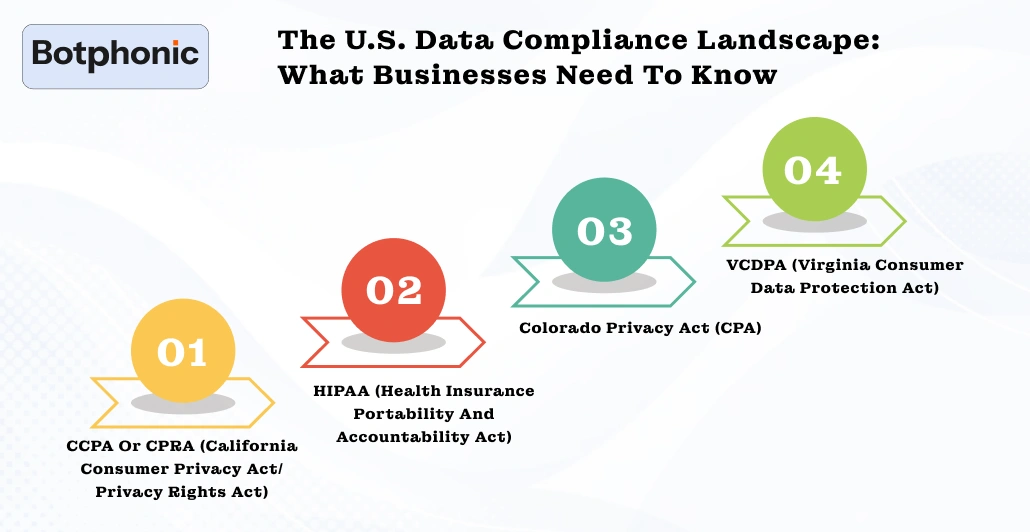
Unlike some countries, the U.S. doesn’t have one single privacy law. But it has a patchwork of regulations, are reported by Data protection laws , such as:
- CCPA or CPRA (California Consumer Privacy Act/ Privacy Rights Act): California is one of the states that leads consumer privacy enforcement. Businesses are bound to disclose what data they are collecting, allow their users to opt out of data sales, and ensure that there’s a secure handling of personal information.
- HIPAA (Health Insurance Portability and Accountability Act): For medical and wellness providers, AI booking systems handle patient appointments to meet HIPAA security standards. For instance, encryption, access control, and audit logging are included.
- Colorado Privacy Act (CPA): It expands user rights around access, deletion, and correction of personal data. Companies that use AI appointment booking systems should give their customers the right to manage their data preferences.
- VCDPA (Virginia Consumer Data Protection Act): This act requires transparency in how AI and automated systems process their consumer data. It dictates risk assessments for profiling and automated decision-making.
For many AI-driven appointment and scheduling software, it just means one thing: that you need a partner who understands compliance from coast to coast.
Explore Botphonics’ AI appointment booking software to ensure every booking is now smart, secure, and seamless.
Try Botphonic Today!!Conclusion
The digital transformation wave is unpredictable. And in the race of automation, security is one of the major components of a winning decision-driving agent. A secure AI appointment booking solution helps you ensure that organizations don’t just run faster but safer.
Whether it’s about growing a small business or an enterprise scaling nationwide, the solution is simple: automate with accountability and operate with transparency. In the modern economy, trust is not just a checkbox but a brand’s greatest asset.
